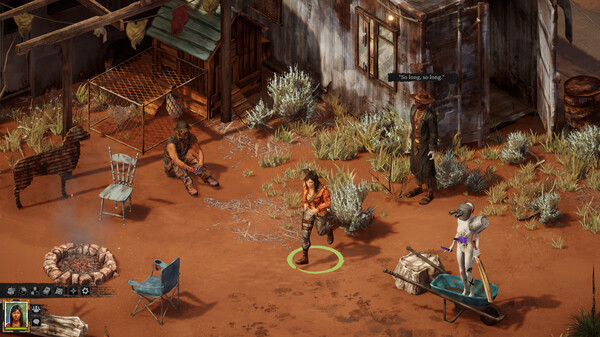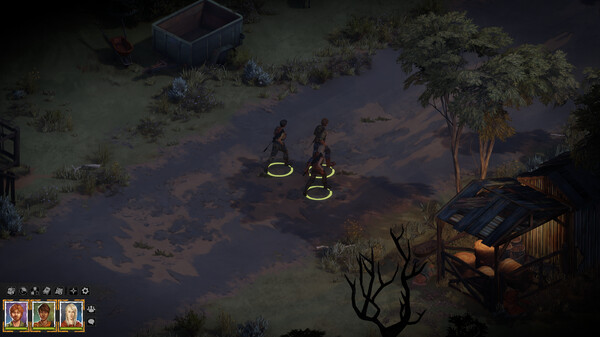During Gamescom in August, one of the signs that the industry was opening back up a little was running into a development team that flew in all the way from Australia. The team at Drop Bear Bytes is working with publisher Versus Evil on Broken Roads, which is a narrative-driven RPG that takes place in a post-apocalyptic version of Australia and includes exploration, strategic turn-based combat and an interesting morality system that promises to offer players ‘meaningful philosophical choices’. As we’re looking forward to some of the most interesting titles of 2023, we checked in with the team to find out more, and spoke to Game Director Craig Ritchie and Narrative Director Leanne Taylor-Giles.
What can you tell us about the development team and how you got to work together?
Craig Ritchie: We started out in January 2019 creating the studio from the ground up, with a barebones team on the classic shoestring budget. We’ve been able to grow the team steadily to the almost 20 people we have today thanks to publisher support and government grants available In Australia, and have also done nearly everything fully remote. In fact, when we travelled to Gamescom in August of last year it was the first time a lot of people on the team had ever met in person. While many of us have worked on games before, this has been our first title for Drop Bear Bytes as a team. I’m really proud of the talented people we’ve attracted and the culture we’ve built up over the last four years.

Broken Roads is set in an Australian post-apocalyptic setting, which makes our mind wander to Mad Max. What does your vision of post-apocalyptic Australia look like?
Leanne Taylor-Giles: Broken Roads is more post-post-apoc than post-apocalyptic. The apocalypse was 100 years ago – people have rebuilt, populations have stabilised, and for the majority of the people you’ll meet, this is the only world they’ve ever known. What we’re interested in is what kind of societies would rise from the ashes of a national government, without electricity, telecommunications, or most of the comforts we take for granted in our everyday lives. I’ve said before that post-apocalyptic settings can be love letters to our favourite parts of the society we live in, and Broken Roads is no exception. Australian culture is unique, though of course not a monolith, and after 10 years living overseas I get to come home with fresh eyes and re-experience all those little details I never knew I’d miss until they weren’t there. Then I put them in the game.
How are you handling narrative progress in the game?
Leanne Taylor-Giles: As an international team, it can be tricky to communicate the finer details of what we’re working on. Mostly we make sure our variables have meaningful descriptions and stay organised by location or quest, and we collaborate on larger documents like asset request lists. We get feedback on each others’ story and quest ideas, and try to create threads between them where a natural link would occur. And, personally, I use callbacks. Referring to something the player did when they thought the game wasn’t watching is one of my favourite storytelling tools.

A new type of morality system is an important gameplay mechanic in Broken Roads. How will this play out in the game?
Craig Ritchie: When the player faces certain difficult decisions, or sometimes when they may have a particular motivation for an action, we place those decisions somewhere on the Moral Compass. Any choices within the player’s World View, indicated by the golden arc you can see on the compass, are then available to them. Instead of being static, however, the compass shifts towards that decision, just by a few degrees clockwise or counterclockwise. If decisions are made within the centre of a character’s world view, the golden arc narrows but its radius extends a little further towards the edge of the compass, allowing for more ‘higher level’ decisions as the character becomes more narrow-minded.
One change we’ve made since we first designed the Moral Compass was to add a small, brighter coloured ‘tendencies’ area at the centre of each quadrant. Lower-level choices fit in here and are available to all players. Each time a decision is made in a particular quadrant, that tendency increases slightly. However, choosing a decision outside of your world view will have the largest effect on shifting your golden arc further, and make a character more broad-minded. In Broken Roads, that means a player might have a wider range of choices available, but some of the more ‘extreme’ options that are closer to the edge of the compass (say, a truly insidious Machiavellian decision or a deeply altruistic Utilitarian action) will be out of reach.
We’re going to open this up to allow players to choose if they want unavailable options to be displayed – they’re hidden by default, but there may be some people who like a hint at the other role-playing direction different character builds could take.

Broken Roads is a party-based RPG – what kinds of party dynamics can we expect?
Leanne Taylor-Giles: Some party members get along, others not so much. Who you have in your party can determine what kind of quest resolutions are opened up or blocked off, and how party members feel about each other will affect how they interact with each other in combat. The player can affect these relationships to some degree, but sometimes the only way to get two characters to like each other is to have them unite in hatred of the player. You know, normal human stuff.
How far into development is the game at the moment, and what is the current focus?
Craig Ritchie: We’re on the home stretch now, finishing the late-game content before doing a full polish pass on the entire thing, for all four origin stories and all the variations of where a player could be on the Moral Compass. Localisation is also underway, and months and months of ongoing QA, balancing and tweaking to get things just right. There’s a lot of moving parts in any RPG and Broken Roads has the additional challenge of making sure the moral quandaries and the player motivations are accurately translated and localised, all the while ensuring that xp rewards, leveling up, combat difficulty, the economy of post-apocalyptic Australia and all those other good things feel great for the player.

One thought on “Developer interview: Broken Roads”